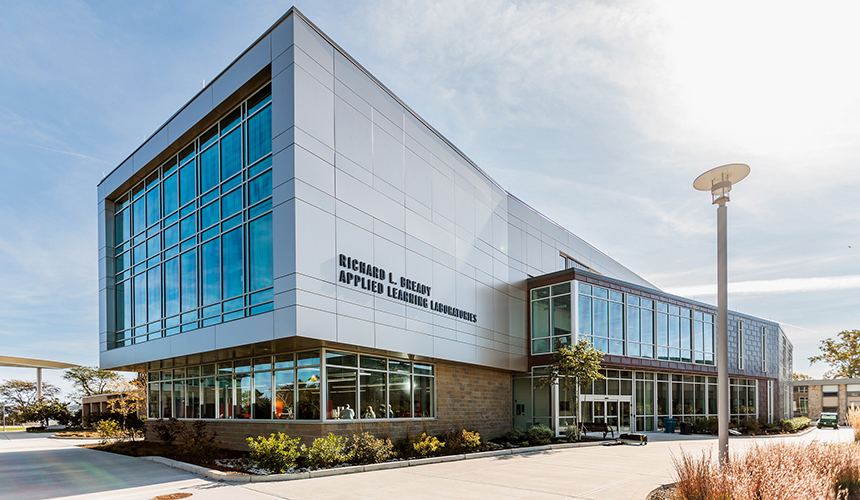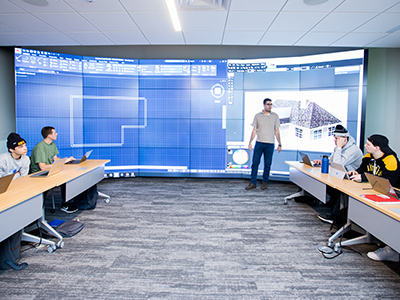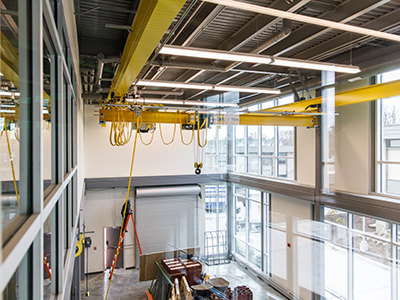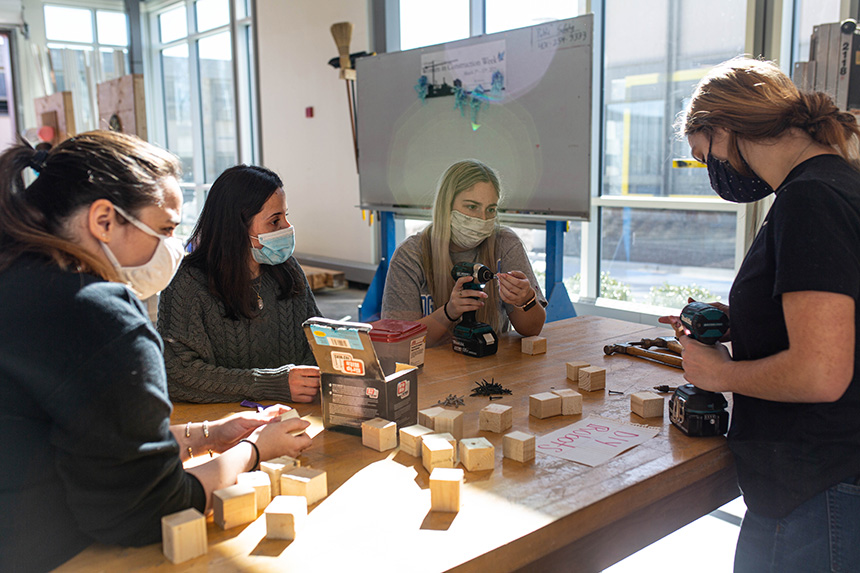Construction Management
RWU prepares future leaders of residential, commercial and heavy-civil projects. Through classes, labs and hands-on projects in engineering, business, math, science, law and liberal arts, Construction Management students learn how to manage construction projects from start to finish — including scheduling, budgeting, choosing materials and safely supervising people.
The Construction Management program is accredited by the American Council of Construction Education (ACCE). This major is coordinated by the Construction Management program.
Success By The Numbers

Placement of Graduates
Through the years, our graduates consistently find success in employment or ingraduate schools within six months of graduation.

First Job, Dream Industry
SECCM graduates land their first jobs in their targeted industries, such as engineering, defense, construction, manufacturing, technology, or consulting.

Average Starting Salary
of 2022 SECCM graduates.
Degree Requirements
Construction Management, B.S.
Construction management represents an industry that organizes or brings together numerous independent businesses and trades to create the built environment. The constructor works closely with owners, engineers, architects, sub-contractors, and building officials before, during and after the construction process to assure successful completion of a project. Our program provides education in technical aspects, such as graphics, equipment, materials, planning and estimating techniques; extensive computer applications exposure; and, the fundamentals of business management. Upon completion of the plan of study, all students will have also earned a Minor in Business.
Construction careers are broadly diversified. Graduates of this program find employment in a variety of sectors in the construction industry, including residential, commercial, and industrial, as well as infrastructure and heavy construction. Typical careers include supervising construction projects, estimating, scheduling, project control and project management.
Roger Williams University is a member of the Associated Schools of Construction, an organization devoted to the development and enhancement of construction education. The Construction Management Program is accredited by the American Council for Construction Education (ACCE). Specific program educational objectives and outcomes include:
Program Mission
The mission of the Construction Management program is to advance the body of construction knowledge through instruction, research, and service and through resourceful graduates who possess the moral foundation and technical skills to lead the profession.
Program Educational Objectives
During the first few years after graduation, we expect our graduates to:
- Demonstrate exemplary cutting-edge technical knowledge and skills.
- Value the concept of life-long learning and continue to grow intellectually while keeping informed of new concepts and developments in the construction process.
- Be recognized as regional, national, and international construction industry leaders.
- Always display the highest standards of ethical conduct.
Program Outcomes
We expect our graduating students to be able to:
- Create written communications appropriate to the construction discipline.
- Create oral presentations appropriate to the construction discipline.
- Create a construction project safety plan.
- Create construction project cost estimates.
- Create construction project schedules.
- Analyze professional decisions based on ethical principles.
- Analyze construction documents for planning and management of construction processes.
- Analyze methods, materials, and equipment used to construct projects.
- Apply construction management skills as a member of a multidisciplinary team.
- Apply electronic-based technology to manage the construction process.
- Apply basic surveying techniques for construction layout and control.
- Understand different methods of project delivery and the roles and responsibilities of all constituencies involved in the design and construction process.
- Understand construction risk management.
- Understand construction accounting and cost control.
- Understand construction quality assurance and control.
- Understand construction project control processes.
- Understand the legal implications of contract, common, and regulatory law to manage a construction project.
- Understand the basic principles of sustainable construction.
- Understand the basic principles of structural behavior.
- Understand the basic principles of mechanical, electrical and piping systems.
Program Requirements
The major in construction management leads to the Bachelor of Science degree and normally consists of 127 credits, including satisfaction of all University Core Curriculum requirements. Students will be required to perform 40 hours of service (as defined and approved by the Program Coordinator) during there their time in the CM program. The approved outline is as follows:
Required Courses
- ACCTG 201 - Accounting I: Financial
- BUSN 305 - Legal Environment of Business I or LS 220 - Contract LawLoading...
- CNST 100 - Introduction to Construction Management
- CNST 116 - Computer Applications for Construction
- CNST 130 - Plans, Specifications and Building Codes
- CNST 200 - Construction Methods and Materials and Lab
- CNST 201 - Advanced Construction Methods and Materials + Lab
- CNST 204 - Applied Statics for Construction
- CNST 250 - Construction Equipment
- CNST 260 - Construction Estimating and Scheduling
- CNST 302 - Surveying + Lab
- CNST 304 - Applied Structures
- CNST 321 - Advanced Building Estimating
- CNST 445 - Construction Project Management and Safety & Lab
- CNST 450 - Construction Planning and Scheduling
- CNST 455 - Building Systems
- CNST 475 - Construction Project Control
- CNST 480 - Capstone Project
- 1 CNST Elective
- ECON 111 - Principles of Microeconomics
- MGMT 200 - Management Principles
- MRKT 200 - Marketing Principles
- MATH 124 - Basic Statistics
- MATH 207 - Applied Calculus
- MATH 136 - Precalculus or MATH 213 - Calculus IorLoading...MATH 214 - Calculus IILoading...
- PHYS 109 - Physics I - Algebra based and Lab
- or
- PHYS 201 - Physics I with Calculus and Lab
Lab Science Elective
Choose 1 of the following courses:
- BIO 104 - Intro to Evolution & Ecology w/ Lab
- CHEM 191 - Principles of Chemistry I and Lab
- ENVS 103 - Earth Systems Science and Lab
- PHYS 240 - Introductory Astronomy with Lab
- BIO 103 - Intro to Molec & Cell Biology w/ Lab
Business Elective
Choose 1 of the following courses:
- ACCTG 304 - Intermediate Accounting I
- ENGR 335 - Engineering Economic Analysis
- FNCE 201 - Financial Management
- MGMT 336 - Negotiations
- MRKT 335 - Consumer Behavior
Recommended Sequence of Courses by Term
First Year (16 credits) - Fall
- CNST 100 - Introduction to Construction Management
- CNST 130 - Plans, Specifications and Building Codes
- 1 General Education Requirement
- MATH 136 - Precalculus or MATH 213 - Calculus I or MATH 214 - Calculus II
- WTNG 102 - How Writing Works
First Year (16 credits) - Spring
- CNST 116 - Computer Applications for Construction
- CNST 200 - Construction Methods and Materials and Lab
- 1 General Education Requirement
- MATH 207 - Applied Calculus
- WTNG course level 200 or higher
Second Year (17 credits) - Fall
- ACCTG 201 - Accounting I: Financial
- CNST 201 - Advanced Construction Methods and Materials + Lab
- 1 General Education Requirement
- PHYS 109 - Physics I - Algebra based and Lab
Second Year (16 credits) - Spring
- CNST 250 - Construction Equipment
- CNST 260 - Construction Estimating and Scheduling
- 1 General Education Requirement
- ECON 111 - Principles of Microeconomics
- BIO 104 - Intro to Evolution & Ecology w/ Lab
or
- CHEM 191 - Principles of Chemistry I and Lab
or
- ENVS 103 - Earth Systems Science and Lab
or
- PHYS 240 - Introductory Astronomy with Lab
Third Year (16 credits) - Fall
- CNST 204 - Applied Statics for Construction
- CNST 302 - Surveying + Lab
- CNST 321 - Advanced Building Estimating
- MGMT 200 - Management Principles
- 1 General Education Requirement
Third Year (18 credits) - Spring
- CNST 304 - Applied Structures
- CNST 450 - Construction Planning and Scheduling
- CORE Core Interdisciplinary Senior Seminar (3 credits)
- MATH 124 - Basic Statistics
- MRKT 200 - Marketing Principles
- 1 General Education Requirement
Fourth Year (16 credits) - Fall
- CNST 445 - Construction Project Management and Safety & Lab
- CSNT 475 - Construction Project Control
- BUSN 305 - Legal Environment of Business I or LS 220 - Contract Law
Fourth Year (15 credits) - Spring
- CNST 455 - Building Systems
- CNST 480 - Capstone Project
- CNST Elective (3 credits)
- Business Elective (3 credits)
- ACCTG 304 - Intermediate Accounting I or
- ENGR 335 - Engineering Economic Analysis or
- FNCE 301 - Financial Management or
- MGMT 336 - Negotiations or
- MRKT 335 - Consumer Behavior
Total: 130 Semester Credits
Construction Management Minor
The Construction Management minor is a six-course program particularly appropriate for students whose major is architecture or business. The courses in the minor are designed to provide students with the skills and basic knowledge required to move into an entry-level professional construction industry position. Estimating, scheduling, and project management are some of the courses that make up the minor.
Program Requirements
Required Courses
- CNST 130 - Plans, Specifications and Building Codes
- or
- ARCH 281 - Architectural Analysis I
- and
- CNST 200 - Construction Methods and Materials and Lab
- or
- ARCH 231 - Construction Materials and Assemblies I
- and
- CNST 260 - Construction Estimating and Scheduling
- *Note: ARCH 484 - Construction Estimating and Scheduling may be taken in
place of CNST 260 - Construction Estimating and Scheduling
Select Two:
- CNST 250 - Construction Equipment
- CNST 302 - Surveying + Lab
- CNST 321 - Advanced Building Estimating
- CNST 450 - Construction Planning and Scheduling
- CNST 445 - Construction Project Management and Safety & Lab
- CNST 455 - Building Systems
- CNST 461 - Residential Construction
- CNST 462 - Advanced Information Technology in Construction
- CNST 463 - Heavy Construction Estimating
Select one:
Construction Management Graduate Certificate
Construction management (CM) represents an industry that coordinates multiple independent businesses, contractors and building trades to erect structures in the built environment. The construction manager works closely with owners, engineers, architects, suppliers, municipalities, and sub-contractors throughout the construction process to assure all of the project goals have been met. This certificate program will provide a sound basis of knowledge to allow students with undergraduate degrees from a wide range of disciplines to work in the construction industry. It also will provide education in both the technical aspects of CM and fundamentals of business management techniques. Students who complete this program will seek employment in many parts of the construction industry, including residential, commercial, and industrial sectors, as well as in infrastructure and heavy construction. Typical careers include supervising construction projects, estimating and cost control, scheduling, and project management.
Required Courses
Select two from the following list
At least one must be a CNST course
- CNST 535 - Facilities Management
- CNST 550 - Special Topics in Construction Management
- CNST 570 - Financial Planning for Construction Projects
- CNST 540 - Sustainable Construction
- ARCH 525 - History of Modern Architecture
- REAL 501 - Real Estate, Equity, and Environment
- REAL 502 - Real Estate Economics, Capital Markets, and Investment
- REAL 544 - Real Estate Market Analysis and Decision Making
- PRES 501 - Fundamentals of Preservation Practice
- MGMT 524 - Ethical Leadership of Organizations
- MRKT 520 - Decisions in Marketing Management
- LEAD 501 - Leaders and the Leadership Process
SECCM FAQ
Does SECCM accept Advanced Placement (AP) credits?
Please visit Advanced Placement for all your questions about AP credits.
How can I redo my math placement?
You can take the online Math placement up to two times. A third time may be allowed as an in-person exam. Please visit Placement by Subject for more information on Math placement and how to register for the online or in-person exam.
What is the writing placement process?
Writing Placement at RWU is determined by a directed self-placement survey. Directed self-placement helps students decide which first-year writing course will be best for them. Please visit Placement by Subject for more information on Writing placement.
Construction Management FAQ
Can I complete the Construction Management program in four years?
Yes, the Construction Management program is designed to be completed in four years, provided students maintain good academic standing and follow the recommended course sequence. Staying on track with required coursework and taking advantage of academic advising ensures a smooth path to graduation. Individual circumstances may vary, so it is important to work closely with your academic advisor to plan your schedule and meet all graduation requirements on time.
Do you recommend I purchase a laptop with certain specifications?
You can purchase a new laptop or use one you already own if it meets or exceeds the specifications published by RWU’s IT department. Please note that students using Apple-based machines or Chromebooks may need to supplement the operating system to be able to work with Intel-only software packages.
What is the typical employment rate for the Construction Management graduates upon 6 months of graduation?
The employment rate for Construction Management graduates is consistently 95-100% within six months of graduation. Employers in the construction industry actively seek our graduates for roles in project management, site supervision, cost estimation, construction scheduling, technology, and more. The strong demand for skilled construction managers in sectors like commercial, residential, and heavy/civil/infrastructure ensures excellent career opportunities for our alumni.
What kind of clubs or student organizations does the Construction Management program offer?
Construction Management students have access to several professional and interest-based organizations, including the Construction Management Club, Women in Construction, Green Building and Sustainable Construction, Associated General Contractors of America (AGC), and Virtual Design and Construction. These organizations provide networking opportunities, industry exposure, hands-on projects, and leadership development, helping students connect with construction professionals, sustainability experts, and industry leaders. A chapter of the Sigma Lambda Chi International Honor Society is also available for those who qualify.
Are there study-abroad opportunities?
Yes, Construction Management students have several study abroad opportunities, with semester-long programs and short-term faculty-led experiences available where students can take courses that align with their degree requirements. Popular destinations have included Ireland, Italy, England, and Australia.
Students interested in studying abroad should meet with their academic advisor as early as possible, ideally at least a year before they plan to travel. Typically, Construction Management students study abroad in the fall or spring semester of their junior year. Many students ask whether they can still graduate on time, and the answer is yes, as long as they follow program guidelines and meet the requirements set by their advisor and the Study Abroad Office.
In addition to semester-long programs, many Construction Management students take advantage of short-term study abroad experiences, such as summer courses that provide international exposure without extending their graduation timeline.
Learn more by visiting RWU’s study abroad webpage.
Are there any opportunities for networking or professional development?
Yes, the Construction Management Club hosts industry speakers, providing students with valuable networking opportunities and insights into the construction industry. Additionally, students can engage with professional organizations such as Associated General Contractors and Women in Construction, which offer events, mentorship, and career development resources.
Can I take classes part-time or online?
The Construction Management program is designed as a full-time, in-person degree to ensure students gain hands-on experience and engage in collaborative learning. Most courses include interactive discussions, team-based projects, and industry-relevant labs, making in-person participation essential.
However, students who need part-time enrollment due to extenuating circumstances should consult with their academic advisor to explore possible options. While some general education or elective courses may be available online, the majority of the core CM curriculum is offered in person.
Are there any opportunities for internships or hands-on experience?
Yes! The Construction Management program at RWU provides extensive hands-on learning opportunities through internships, externships, and industry partnerships that prepare students for real-world challenges in the construction industry.
Students gain practical experience in courses that feature lab-based learning and full-scale construction activities. Our Methods and Materials Lab is equipped with a 2-ton capacity crane, allowing students to build everything from houses and timber structural frames to steel structures and foundations. The program also includes access to an Emerging Technologies Lab, where students work with Virtual Design and Construction (VDC), Building Information Modeling (BIM), and other cutting-edge construction technology. Additionally, the Shawmut Construction Management Project Center provides a professional setting where students simulate project management meetings, role-play industry scenarios, and develop leadership skills.
Most Construction Management students complete one to three summer paid internships before graduation, gaining hands-on experience with general contractors, construction management firms, and subcontractors. Shorter externships provide shadowing experiences that offer insight into daily operations on construction sites and in corporate offices. The Center for Career & Professional Development (CCPD) assists students in securing internships and externships, preparing resumes, and connecting with industry professionals.
RWU’s CM Professional Advisory Board—comprised of leaders from a wide range of regional and national construction and building industry firms—actively supports student success by offering mentorship, networking opportunities, and career guidance. Students also participate in site visits, industry panels, and national and regional construction competitions through organizations like the Construction Management Club, Associated General Contractors, and Virtual Design and Construction. These hands-on experiences and industry connections ensure RWU Construction Management graduates are well-prepared for leadership roles in the field.
Are there any resources available for students who need additional academic support?
Yes! Roger Williams University offers a range of academic support resources to help students succeed. The Tutoring Center provides free tutoring in subjects like math, writing, science, and business, as well as dedicated support for engineering courses through the SECCM Tutoring Center. The Center for Student Academic Success (CSAS) offers academic advising for the first year, peer mentorship, and Student Accessibility Services (SAS) for students who need accommodations. Construction Management students also benefit from small class sizes and a dedicated construction faculty advisor who provides academic guidance starting their second year in the program. These combined resources ensure that students have the support they need to excel academically and professionally.
What is the typical class size for construction management courses?
Most construction management courses have around 24 students, typically ranging from 20 to 30. Lab sections are even smaller, usually between 12 and 16 students, ensuring hands-on learning, close faculty interaction, and individualized support. This structure allows students to collaborate effectively, engage deeply in experiments and design work, and receive personalized instruction.
Can I do a minor in another program?
Yes! Construction Management students automatically earn a minor in Business by completing the program requirements. Additionally, students have the option to pursue a second minor, choosing from over 70 available minors across various disciplines.
Popular second minors for CM students include Real Estate, Sustainability, Visual Arts, Architecture, and more, allowing them to tailor their education to their interests and career goals. RWU’s flexible general education curriculum makes it possible for students to complement their Construction Management degree with additional expertise in related or interdisciplinary fields.
Full list of majors and minors offered at RWU.
What kinds of career opportunities are available for the graduates?
RWU Construction Management graduates enjoy exceptional employment rates, with many securing offers before graduation. Thanks to our dedicated Construction Industry Career Fair, students have direct access to a wide range of companies across various sectors, including commercial, residential, heavy highway, and infrastructure construction.
Graduates work for hundreds of companies worldwide, including firms such as:
- Consigli Construction Co., Inc.
- Shawmut Design and Construction
- Gilbane Building Company
- The Whiting-Turner Contracting Company
- Dimeo Construction Company
- Turner Construction Company
- Hensel Phelps
- Suffolk Construction
- Skanska
- PMA Consultants
- A/Z Corporation
- BOND Building Construction
- O&G Industries, Inc.
- New England Construction Co., Inc.
At the time of graduation, students typically secure positions such as Project Engineer, Field Engineer, Assistant Project Manager, Project Manager, Assistant Superintendent, Superintendent, BIM Engineer, Consultant, Cost Estimator, Scheduler, Business Development Officer, or Safety Manager. These roles provide strong career growth opportunities in the construction industry.
What research opportunities exist?
Our construction management program offers numerous research opportunities for students, starting as early as their first year. Many faculty members have research projects funded both internally and externally, which often require student research assistants for both short and long-term engagements.
Students interested in participating in research should express their interest to their instructors and explore the faculty research interests on our faculty page. While ongoing paid research opportunities are not guaranteed, reaching out to faculty members is the first step.
Paid research opportunities are typically available every semester, including winter and summer sessions. Students generally work a few hours per week during the regular semesters, with the potential to work up to 20 hours per week. During the winter and summer semesters, opportunities to work up to 40 hours per week are also available. This hands-on experience is invaluable for students looking to deepen their understanding of their field and contribute to cutting-edge construction research projects.
State-of-the-Art Facilities

Our 27,000-square-foot, three-story, state-of-the-art Richard L. Bready Applied Learning Laboratories building is the newest addition to the Bristol campus. This cutting-edge facility is designed for unique hands-on learning using the latest industry tools and technology, with plenty of flexible collaboration spaces, project rooms, and study areas.
 Emergent Technologies Lab
Emergent Technologies Lab
In the Emergent Technologies lab, 24 television screens side-by-side make an interactive display for students to practice working with virtual reality programming and other state-of-the-art technology. "We can have groups presenting their work next to each other and compare them in real time. We create digital models, actual-size, and walk through the buildings," said Bilge Gökhan Çelik, professor of Construction Management.
 Methods and Materials lab
Methods and Materials lab
Students learn practical construction skills as they build an entire model house, from the foundation to basic plumbing and electrical in the Methods and Materials lab, which includes a two-story construction management high bay with an overhead crane.
Advanced Technology and Innovation Studio
This maker space houses 3-D printers and other hands-on fabrication tools to support student creativity and design.
Graduate with an Embedded Business Minor
With an emphasis on the management aspect of projects, all Construction Management students graduate with a minor in Business from RWU’s AACSB-accredited Gabelli School of Business. Employers seek the practical skills of the additional business minor provides as new graduates enter the workforce.
One-On-One Advising
As a Construction Management student, you will benefit from one-on-one advising with a faculty member throughout your time at RWU. Our faculty members are experts in the field and have connections throughout the industry to assist you in finding construction internships and full-time jobs.
Learn from Faculty Experts
 Jung Hyun Lee, Ph.D.
Jung Hyun Lee, Ph.D.
Assistant Professor of Construction Management
Jung Hyun Lee is a construction management educator, researcher, and professional with expertise in alternative project delivery, construction contracts, and public policy. Utilizing her diverse background and experiences from South Korea to the U.S., she is dedicated to infusing real-world perspectives into her teaching and creating a dynamic learning environment for her students.
“One of the most rewarding aspects of teaching for me is observing the growth and development of my students' knowledge and skills over time," she said. "The combination of assignments, in-class exercises, and case-study projects contribute to their rigorous and meaningful learning experience.”
Alumni Share Their Experiences
“I’ve had three internships with three different companies. I found those because of career fairs at Roger and using the Center for Career and Professional Development. My first internship was with Gilbane Building Company, who came across my resume from a career fair. They took me on as a first-year student."
Kyle Mozdzierz ’22
VCD BIM design engineer at Dimeo Construction Company in Providence, R.I
More: Building Connections at RWU Leads Construction Management Grad to Success
"Half of the people in our office are RWU alumni. I really think it comes down to the program. It’s one of the best programs in the area."
Samantha Denton '20
Assistant Project Manager/Intern Coordinator at Pariseault Builders Inc. in Providence, R.I.
“Throughout my four years at RWU I had six three-month internships, three of which were with Hensel Phelps Construction Company. I was hired full-time in July 2021. If you don’t have an internship, your professors will reach out to people they know and help you find one. They want to see all of us get that work experience.”
Julia Pateman '21
Field Engineer at Hensel Phelps in Los Angeles, Calif.
Graduates Hired By Top Companies
Our Construction Management graduates are hired by top companies, including:
- Bentley Builders
- Cardi Corporation
- Consigli Construction
- Eversource Energy
- Gilbane Building Company
- Hensel Phelps Construction
- Pariseault Builders
- Shawmut Design and Construction
- Whiting-Turner Contracting
Employer Praise for RWU Alumni
“We couldn’t have a better partner in developing the most talented professionals for our industry than Roger Williams University, with its outstanding and nationally ranked programs in construction management and engineering.”
Les Hiscoe
CEO of Shawmut Design and Construction
Ways to Get Involved
Our clubs and organizations offer students a variety of ways to get more involved in the program, get connected with the construction industry, take advantage of leadership positions, and network with other students and professionals.
Construction Management Club
RWU's Construction Management Club provides students opportunities to strengthen their bond with classmates & faculty, to learn beyond the classroom, to augment their passion, and to gain valuable networking and career opportunities
Sigma Lambda Chi International Construction Honor Society
With membership by invitation, the Sigma Lambda Chi International Construction Honor Society provides local and international recognition to outstanding students in construction curricula.

Women In Construction
The Women in Construction club encourages and supports women in construction or management-related majors to become leaders in a predominantly male industry.
Residential Construction Club
The Residential Construction Club gives students who are specifically interested in the residential side of the construction industry an opportunity to connect to industry, conduct research, and compete in the National Association of Home Builders (NAHB) student competition.

U.S. Green Building Council Student Group
The U.S. Green Building Council Student Group fosters scientific study and research in the field of environmentally sustainable building and operation of buildings. Members promote understanding, adoption and use of environmentally sustainable design, construction, and building operation practices across the Roger Williams University community.
Associated General Contractors of America Student Chapter
Members of the Associated General Contractors of America Student Chapter attend seminars presented by representatives from the construction industry, strengthening their connection with the industry and receiving assistance in their pursuit of employment.
Multicultural STEM Alliance
The Multicultural STEM Alliance aims to strengthen the sense of community among students of color in STEM majors at RWU by offering activities, mentorship, and networking opportunities at and outside of the university.
Construction Management Competition Teams
Competition Teams provide students the opportunity to practice the skills and apply the knowledge they have gained in the classroom to real-life scenarios by competing at the regional, national, and international levels.


